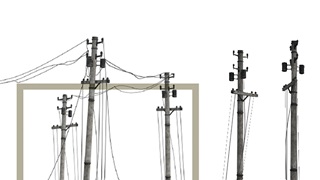
Stringers
Reports from our global correspondents on life under the headlines


—Reports filed by correspondents across the world—
I am Russian, and I have noticed one thing while watching how people follow rules. In a situation where one person prioritises 'voice of reason' over prescribed rules, others would prefer to be obedient. No matter how absurd those prescribed rules in a particular situation are, some would prefer to follow them and some not. I am not talking about cultures based on strict orthodoxies, only about the modern secular world, the one I observe.
One incident which illustrates my point happened during a trip I made to America to visit my cousin, a recent emigré from Russia. My nephew was a couple of months old at the time, and we were having a picnic in a rural area by a local river. Each time the baby's wipes needed to be changed, my sister had to go a long way to a toilet. The toilet, I have to note, was rather dirty, because it was that kind of a beach place. I was a little surprised and asked why not change the wipes right here by the water on linen bedding, in more pleasant surroundings and cleaner sanitary conditions. She answered: this is prohibited. I was inclined not to obey that ruling. But I heard that there was a fine to pay and no way to avoid it if you are caught. So I became obedient.
Another incident took place in Switzerland, in a ski resort. We had occupied a table for six in the open- sky area of a mountain restaurant, the type with self-service and a casual atmosphere, where people are in their ski outfits. Three of us were having snacks and drinks and waiting for the others. When a Swiss member of our company arrived, he said that he would not join us because he had brought something to eat from home and, he insisted, he should eat at a special place rather than with us.
No doubt there are situations where rules could be ignored. But what if the mere concept of strict adherence to the rules, regardless of situation, makes life more comfortable and secure? Look at how people of different nationalities prefer to form a queue. Who are the most messy and chaotic? I think maybe the Chinese and the Russians.
There is a trait in the Russian character which we call the 'who cares?' attitude. We Russians know its origin. This is the seventy-year-long legacy of State property, when no one took care of the crops on the collective farm and you could bribe your way out of trouble with the traffic police. This trait is still deeply rooted inside us, even nowadays, in the changed era of private property. The 'who-cares?' attitude gives us a pleasant feeling of freedom. Ordinary Russians feel free when it comes to the small things of everyday life. But are they free when it comes to decisions which influence people's lives or the life of the whole country?
September 15, 2008: Lehman Brothers files for Chapter 11 bankruptcy protection. It is the largest filing in U.S. history, listing debts of over US$600 billion, and sparks panic in the global financial markets. Thousands of jobs are lost. Dazed employees are photographed leaving the bank's offices carrying their belongings in cardboard boxes.
September 11, 1844: 23-year-old Hayum Lehmann, wearing his best shoes, arrives in America from Germany. He swiftly anglicizes his name to Henry Lehman. Two younger brothers follow, Mendel (Emanuel) in 1847 and Mayer in 1850. In Alabama, they work together in Henry's store, selling suits and fabrics, accepting raw cotton from customers as payment. They later establish a cotton brokering company, which they call Lehman Brothers.
To trace the story of these brothers and their descendants is to trace the history of Western capitalism over two centuries. It is also a dazzling manifestation of the American Dream. The business they built and nurtured was remarkable, ambitious, resilient. It survived the American Civil War and the Great Depression. It moved to New York and branched out into coffee, sugar and oil trading, became a bank and invested in retail, railways, aviation and cinema. When King Kong scaled the Empire State Building in 1933, it was with Lehman Brothers' backing. Management of the company was handed down from Lehman father to Lehman son, until Emanuel's grandson, Robert 'Bobbie' Lehman died in 1969, leaving a void. Control passed from the family into the hands of the company's trading division. And the rest, as they say, is history.
Understandably, the monumental disaster of the bank's collapse has overshadowed, perhaps even tainted, in modern minds all that came before. This imbalance is interestingly probed in a play, The Lehman Trilogy, which transferred to New York from London in March; it's a drama by an Italian playwright, mostly about the Lehman family but also about the bank, because, really, the family was the bank. The dreadful denouement, when it comes, takes up only a small part of the action.
The New York audience loved it, and I think that was partly because it offered a tonic to the American vision of itself. The polarisation of contemporary American politics has become conventional wisdom, and any kind of schism is destabilising for national self-fashioning. I think there is a kind of agonising among New Yorkers—maybe among other Americans, too—about what it means just now to be American. I think a similar crisis of identity is being played out in my native Britain. Escape into drama and the past is a welcome relief.
I nearly lost my balance as the train lurched ahead. It served me right, climbing the fence and jumping onboard this railway car. I had thought it was an old abandoned train car and I wanted to take a picture as the African sun started to set. It was not abandoned—it was one of the railway's passenger cars and this was how people traveled.
I jumped out of the car as it picked up speed, did my best James Bond roll, and stood up, dusting myself off. I wandered back along the tracks toward Maputo's train station. Built by the Portuguese more than a century ago, the paint was peeling and some windows were broken, but the building is beautiful and is loved.
As I walked back to my hotel through the marketplace outside the station, I was struck by the contrast between the evening activities in the streets of Mozambique and my walk along the marina in Dubai the night before. Last night, I walked past yachts bobbing in the harbour; rarely operated, often simply a display of wealth. Here in Maputo, the streets were dirty with trash scattered about and street vendors calling out as they sold tee shirts, cheap plastic goods, and roasted peanuts. The contrast was stark and unsettling.
Mozambique is war-torn. Its infrastructure is failing. And tens of millions of dollars of foreign aid have somehow vanished. But, tomorrow is starting to look more promising. The world's largest gas discoveries of the last five years have been found off the shores of east Africa. Each time I travel into the country now, I spy the usual luggage tags on the suitcases accompanying my fellow travellers in the airport lounge: many of the major players are now spending time in Mozambique as they try to line up the hundreds of moving parts that a successful project requires.
I crossed the street, followed the sound of singing and came upon a wedding serenade. There were smiles, there was laughter, much like any wedding anywhere. Everyone seemed to be looking forward to what tomorrow would bring.
© Norton Rose Fulbright LLP 2025